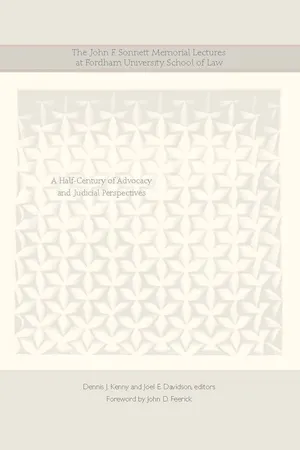
The John F. Sonnett Memorial Lectures at Fordham University School of Law
A Half-Century of Advocacy and Judicial Perspectives
- 480 pages
- English
- ePUB (mobile friendly)
- Available on iOS & Android
The John F. Sonnett Memorial Lectures at Fordham University School of Law
A Half-Century of Advocacy and Judicial Perspectives
About this book
This book represents the distinguished Sonnett lecture series sponsored by Fordham's Law School that has taken place for the last 45 years. In this collection, U.S. Supreme Court Justices, a Lord Chancellor of England, three Chief Justices of Ireland, a Chief Justice of South Africa, a President of the Supreme Court of Israel, and other leading judges and lawyers examine common law–based legal systems and underlying principles. The lectures encourage attorneys and society to improve the training of lawyers, respect the independence of the judiciary, place ethics at the forefront, question the efficacy of the criminal justice system, and explore the complex philosophical issues facing the judiciary.Taken as a whole, these lectures are a prescription for improvements and innovations throughout the legal system. The lectures were delivered by judges and lawyers who were involved in many of the most significant cases of the last half-century that strengthened individual rights and promoted access to justice. Each finds its deepest meaning in advancing the theme of Fordham Law School: "In the Service of Others."
Frequently asked questions
- Essential is ideal for learners and professionals who enjoy exploring a wide range of subjects. Access the Essential Library with 800,000+ trusted titles and best-sellers across business, personal growth, and the humanities. Includes unlimited reading time and Standard Read Aloud voice.
- Complete: Perfect for advanced learners and researchers needing full, unrestricted access. Unlock 1.4M+ books across hundreds of subjects, including academic and specialized titles. The Complete Plan also includes advanced features like Premium Read Aloud and Research Assistant.
Please note we cannot support devices running on iOS 13 and Android 7 or earlier. Learn more about using the app.
Information
Table of contents
- Cover
- Half Title
- Title Page
- Copyright
- Contents
- Foreword by John D. Feerick
- Editors’ Note
- Half Title
- The Art of Advocacy
- The Role of the Judge
- Prison: The Judge’s Dilemma
- The Special Skills of Advocacy: Are Specialized Training and Certification of Advocates Essential to Our System of Justice?
- The Decline of Professionalism
- The Compleat Advocate
- Minnesota Plan: Mandatory Continuing Legal Education for Lawyers and Judges as a Condition for the Maintaining of Professional Licensing
- The Most Lustrous Branch: Watergate and the Judiciary
- The Attorney General: The Federal Government’s Chief Lawyer and Chief Litigator, or One Among Many?
- Cruel and Unusual Punishments: The Proportionality Rule
- Intelligence Gathering and the Law: Conflict or Compatibility?
- Waste Not, Wait Not: A Consideration of Federal and State Jurisdiction
- Barristers and Judges in England Today
- The Supreme Court of the United States: Managing Its Caseload to Achieve Its Constitutional Purposes
- The Office of Chief Judge of a Federal Court of Appeals
- Advocacy: Has It a Future?
- Untitled (Sonnett Lecture)
- The Invisible Prince
- Fictions
- Legal Remedies for the Failure of European Community Institutions to Act in Conformity with EEC Treaty Provisions
- The Advocate: Should He Speak or Write?
- Appellate Advocacy: Some Reflections from the Bench
- Law and Lawyers: The Road to Reform
- Matters of Life and Death
- Lawyering for a New Age
- The Role of a Supreme Court in a Democracy
- The Secret Life of Judges
- A Pillar of Democracy: Reflections on the Role and Work of the Constitutional Court of South Africa